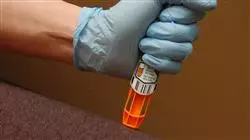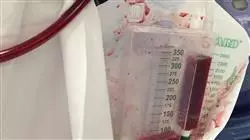University certificate
The world's largest faculty of nursing”
Introduction to the Program
The prognosis of people in an emergency situation is conditioned by the updated knowledge of the professionals who attend them and their actions at the moment of facing them. Learn how to identify, initially treat and transport patients with emergency pathologies"

In a medical emergency, time is a critical factor. The prognosis of the pathologies that we consider emergencies is directly related to the time that elapses since they begin until they are treated. It is essential, therefore, that professionals keep themselves constantly updated in order to adequately attend to the different medical emergencies in any situation.
The Postgraduate diploma in Medical Emergencies for Nurses is designed so that the nursing professional can update their knowledge to provide quality patient care in emergency situations, based on the latest scientific evidence.
Thus, upon completion of the course, the student will be able to prioritize situations, solve problems and make decisions in the care and provision of care to the critically ill patient, both in the adult and pediatric patient.
Through this Postgraduate diploma you will be able to update your knowledge in patient care in medical emergencies, improve prognosis and reduce sequelae and complications"
This Postgraduate diploma in Medical Emergencies for Nurses contains the most complete and up-to-date scientific program on the market. The most important features of the program include:
- Clinical cases presented by experts. The graphic, schematic, and eminently practical contents with which they are created provide scientific and practical information on the disciplines that are essential for professional practice.
- Diagnostic and therapeutic innovations in treating patients in an emergency situation. It includes the most frequent pathologies, the first care actions and the transfer of the patient to the specialized center.
- It also includes nursing procedures such as: emergency electrocardiography, emergency pharmacology, gynecological emergencies and childbirth, protocol of action in case of mistreatment and abuse, etc.
- Presentation of practical workshops on procedures, diagnosis, and treatment techniques.
- Algorithm-based interactive learning system for decision-making in the presented clinical situations.
- Theoretical lessons, questions to the expert, debate forums on controversial topics, and individual reflection assignments.
- Content that is accessible from any fixed or portable device with an Internet connection.
This Postgraduate diploma may be the best investment you can make in the selection of a refresher program for two reasons: in addition to updating your knowledge in medical emergency care, you will obtain a diploma from TECH Global University"
Its teaching staff includes leading nursing professionals, who bring to this specialization the experience of their work, as well as other professionals who specialize in the various fields of emergency medical care.
The multimedia content developed with the latest educational technology will provide the professional with situated and contextual learning, i.e., a simulated environment that will provide immersive training program to train in real situations.
The design of the program is based on Problem-Based Learning, by means of which the nursing professional must try to solve the different professional practice situations that arise throughout the program. For this reason, you will be assisted by an innovative, interactive video system created by renowned and experienced experts in emergencies and with extensive teaching experience.
This program offers training in simulated environments, which provides an immersive learning experience designed to train for real-life situations"

It includes clinical cases to bring the program's degree as close as possible to the reality of care in Nursing"
Why study at TECH?
TECH is the world’s largest online university. With an impressive catalog of more than 14,000 university programs available in 11 languages, it is positioned as a leader in employability, with a 99% job placement rate. In addition, it relies on an enormous faculty of more than 6,000 professors of the highest international renown.

Study at the world's largest online university and guarantee your professional success. The future starts at TECH”
The world’s best online university according to FORBES
The prestigious Forbes magazine, specialized in business and finance, has highlighted TECH as “the world's best online university” This is what they have recently stated in an article in their digital edition in which they echo the success story of this institution, “thanks to the academic offer it provides, the selection of its teaching staff, and an innovative learning method aimed at educating the professionals of the future”
A revolutionary study method, a cutting-edge faculty and a practical focus: the key to TECH's success.
The most complete study plans on the university scene
TECH offers the most complete study plans on the university scene, with syllabuses that cover fundamental concepts and, at the same time, the main scientific advances in their specific scientific areas. In addition, these programs are continuously being updated to guarantee students the academic vanguard and the most in-demand professional skills. In this way, the university's qualifications provide its graduates with a significant advantage to propel their careers to success.
TECH offers the most comprehensive and intensive study plans on the current university scene.
A world-class teaching staff
TECH's teaching staff is made up of more than 6,000 professors with the highest international recognition. Professors, researchers and top executives of multinational companies, including Isaiah Covington, performance coach of the Boston Celtics; Magda Romanska, principal investigator at Harvard MetaLAB; Ignacio Wistumba, chairman of the department of translational molecular pathology at MD Anderson Cancer Center; and D.W. Pine, creative director of TIME magazine, among others.
Internationally renowned experts, specialized in different branches of Health, Technology, Communication and Business, form part of the TECH faculty.
A unique learning method
TECH is the first university to use Relearning in all its programs. It is the best online learning methodology, accredited with international teaching quality certifications, provided by prestigious educational agencies. In addition, this disruptive educational model is complemented with the “Case Method”, thereby setting up a unique online teaching strategy. Innovative teaching resources are also implemented, including detailed videos, infographics and interactive summaries.
TECH combines Relearning and the Case Method in all its university programs to guarantee excellent theoretical and practical learning, studying whenever and wherever you want.
The world's largest online university
TECH is the world’s largest online university. We are the largest educational institution, with the best and widest online educational catalog, one hundred percent online and covering the vast majority of areas of knowledge. We offer a large selection of our own degrees and accredited online undergraduate and postgraduate degrees. In total, more than 14,000 university degrees, in eleven different languages, make us the largest educational largest in the world.
TECH has the world's most extensive catalog of academic and official programs, available in more than 11 languages.
Google Premier Partner
The American technology giant has awarded TECH the Google Google Premier Partner badge. This award, which is only available to 3% of the world's companies, highlights the efficient, flexible and tailored experience that this university provides to students. The recognition as a Google Premier Partner not only accredits the maximum rigor, performance and investment in TECH's digital infrastructures, but also places this university as one of the world's leading technology companies.
Google has positioned TECH in the top 3% of the world's most important technology companies by awarding it its Google Premier Partner badge.
The official online university of the NBA
TECH is the official online university of the NBA. Thanks to our agreement with the biggest league in basketball, we offer our students exclusive university programs, as well as a wide variety of educational resources focused on the business of the league and other areas of the sports industry. Each program is made up of a uniquely designed syllabus and features exceptional guest hosts: professionals with a distinguished sports background who will offer their expertise on the most relevant topics.
TECH has been selected by the NBA, the world's top basketball league, as its official online university.
The top-rated university by its students
Students have positioned TECH as the world's top-rated university on the main review websites, with a highest rating of 4.9 out of 5, obtained from more than 1,000 reviews. These results consolidate TECH as the benchmark university institution at an international level, reflecting the excellence and positive impact of its educational model.” reflecting the excellence and positive impact of its educational model.”
TECH is the world’s top-rated university by its students.
Leaders in employability
TECH has managed to become the leading university in employability. 99% of its students obtain jobs in the academic field they have studied, within one year of completing any of the university's programs. A similar number achieve immediate career enhancement. All this thanks to a study methodology that bases its effectiveness on the acquisition of practical skills, which are absolutely necessary for professional development.
99% of TECH graduates find a job within a year of completing their studies.
Postgraduate Diploma in Medical Emergencies for Nursing
One of the many skills that health personnel must have is the ability to react immediately to emergency situations; a timely response can preserve health and save many lives. Because these critical moments can occur anywhere, nursing staff must have the necessary skills to treat and transport patients with severe pathologies. For this and more reasons, professionals are constantly specializing in order to achieve adequate management of each patient at risk. To contribute to this educational need, TECH designed a Postgraduate Diploma in Medical Emergencies for Nursing that, in addition to addressing life-threatening pathophysiological processes, delves into the appropriate care protocols for each problem. Within the agenda of this postgraduate Postgraduate Diploma, students will find topics ranging from health action protocols, equipment identification and communication systems in an EMS (medical emergency system), to the process of prioritization, organization and care management. clinic using the triage tool.
Take an online Postgraduate Diploma
At the TECH School of Nursing we have a group of professionals specialized in providing effective support during the training process of each student. By taking this program you will have the security of receiving the most innovative education in the industry, which includes the analysis of clinical cases that will allow you to reinforce your knowledge to face the challenges that this field requires. Therefore, you will be able to apply health care protocols in pathologies such as heart rhythm disturbances, ischemic heart disease, neurological disorders, acute pulmonary edema, poisoning, trauma and anaphylactic reactions, among others.
Get a postgraduate degree from the world's largest digital university
After completing this Postgraduate Diploma, you will be able to prioritize situations, solve problems and make decisions in the provision of care to patients of any age. During six months of intensive preparation you will be able to understand the basic operation of an emergency and/or emergency coordination center, to provide quality care based on the latest scientific evidence; This will allow you to improve the prognosis and reduce the sequelae, complications or mortality of each person attended.







